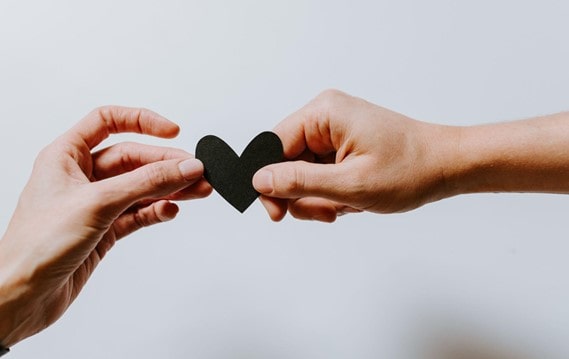The Art of Giving and Getting Reassurance in Relationships

“Love is not about how many days, months, or years you have been together. Love is about how much you love each other every single day.”
Relationships are beautiful experiences but at the same time, they can be quite complicated. We often find ourselves seeking comfort and reassurance from our partners or loved ones to figure out the ups and downs that come our way. But what is reassurance in a relationship? Or what counts as reassurance in relationships?
When I say reassurance, I mean the understanding and validation that we get in our relationships. It’s the comforting words, gestures, and presence of your partner that remind you that you’re not alone in your doubts and insecurities. Reassurance in a relationship builds trust, strengthens your connection, and eases your anxieties.
Simply put, reassurance in relationships is the glue that holds you together when life throws uncertainties and challenges at you, offering a blanket of security and love that helps you thrive.
But, is it normal to need reassurance? How can I give and get reassurance in a healthy way? Keep reading this article to find the answer to these questions. We’ll also help you understand the importance of reassurance in maintaining strong, supportive relationships.
What is Reassurance?

Reassurance in a relationship is like a warm hug for your emotions. It’s the act of seeking comfort, confirmation, or encouragement from your partner when you’re feeling uncertain, anxious, or insecure.
Reassurance can come in various ways – from kind words to a tight hug and from being there for each other to sitting in silence in a comforting embrace. Needing constant reassurance might seem to you as being clingy, but it’s normal. I mean, let’s face it. We all have our moments of doubt in a relationship, so seeking reassurance is a way to cope with these feelings.
Wanting to feel reassured and emotionally safe in a relationship is a part of being human; it doesn’t mean you’re clingy or needy. It simply means that you’re willing to share your feelings and vulnerabilities with the one you trust the most.
Reassurance in a relationship examples can be something like this;
- Saying simple words like “I love you,” “I’m here for you,” or “You mean the world to me” can provide emotional reassurance.
- Spending quality time together and enjoying each other’s company strengthens your emotional connection.
- Accepting mistakes, apologizing, and forgiving each other, when necessary, reassures your partner that you’re willing to work through all of it together.
- Celebrating special dates like birthdays and anniversaries can be a meaningful way to provide reassurance.
Healthy Vs. Unhealthy Reassurance
Reassurance in relationships is normal, but there’s a difference between healthy reassurance and an unhealthy one.
Healthy reassurance involves open communication, trust, and mutual support. On the other hand, unhealthy reassurance can become a constant, overwhelming need that puts pressure on your partner, leading to codependency or strained relationships.
What it all comes down to is to have and maintain a balance and not rely only on your partner for your emotional needs and well-being.
In a relationship, healthy reassurance can look like this;
- Constant encouragement when your partner cheers you on when you struggle with doubts and challenges
- Constant affection when your partner hugs, kisses, or embraces you to show their care and love
- Actively listening when your partner not only listens but understands and empathizes with you and your concerns
- Verbal support and encouragement when your partner offers kind words, compliments, and affirmations to boost your confidence
- Constant reliability when you and your partner are there for each other in times of need
Why Do You Need Constant Reassurance?

There’s no one who doesn’t crave a sense of security and warmth from the one they love the most. However, there is always someone who needs constant reassurance. Why? Well, there could be many reasons why you or your partner might need constant reassurance.
For one, insecurities about yourself, your self-worth, and/or the stability of your relationship can cause you to need constant reassurance. Even if you’ve had previous negative experiences in relationships, you might struggle with relationship-specific insecurities and anxiety that might cause you to seek constant reassurance from your partner.
People with anxious or insecure attachment styles may also seek constant reassurance more frequently because they are more sensitive to their partner’s behavior. Even poor communication in the relationship can cause misunderstandings and uncertainties, causing you to seek reassurance to clear doubts.
Now, some people struggle with the fear of rejection or abandonment. This fear can also drive you to seek constant reassurance in relationships. You might fear that your partner will leave you or stop caring about you if they don’t validate your worth.
In many cases, underlying mental health concerns such as depression or borderline personality disorder can be the cause of your constant need for reassurance in a relationship.
How to Stop Seeking Reassurance?
If you’re the one who seeks constant reassurance from your partner in a relationship, then you need to understand if the reassurance you seek is healthy or unhealthy. If your behavior signals unhealthy reassurance, then here’s what you can do to stop seeking unhealthy reassurance;
1. Reflect on Your Causes
Think about the root causes of your need for reassurance in a relationship. Knowing what triggers your insecurities can help you take the steps you need to address them.
2. Practice Self-Soothing
You can also work on self-soothing strategies to manage your anxiety or insecurities without relying on reassurance. You can try mindfulness, deep breathing, and meditation to soothe your emotions.
3. Challenge Negative Thinking
Identify negative thoughts that lead you to seek reassurance in relationships. Techniques such as cognitive-behavioral therapy can help you reframe your thinking and reduce the anxiety that comes with seeking reassurance.
4. Talk About Your Feelings
Talk to your partner about your struggle to stop seeking reassurance. Sharing your feelings and concerns with your loved ones can help them understand what you’re feeling and how to help you.
5. Talk to a Therapist
You can also reach out to your therapist or even your friends and family to seek support and share your feelings. Sometimes, we need an external support system that can provide the comfort and support we need to overcome our insecurities.
How to Give Reassurance in Relationships?

Giving reassurance in a relationship is just as important as asking for reassurance. Here are some practical ways you can give reassurance to your insecure partner;
1. Actively Listen to Them
When your partner expresses their feelings, concerns, or insecurities, actively listen to them. Show genuine interest and empathy by keeping eye contact, nodding, and asking open-ended questions that encourage them to share more.
2. Use Your Words
To give reassurance and comfort to your partner, you need to use your words. Offer verbal affirmations and compliments that validate your partner’s worth and feelings. Even simple words and phrases such as “I love you”, “You mean a lot to me” or “I believe in you” can be helpful.
3. Give them Hugs
If your partner is comfortable with physical touch, then you can use physical touch such as hugs and kisses as a form of reassurance. Simply cuddling with them or holding their hands when they are worried can show your love and care for them.
4. Be Consistent with Your Support
Another way to give reassurance in relationships is to be reliable and consistent in the emotional support that you give your partner. Show them that you’re there for them through thick and thin. Your constant presence can help them feel secure in the relationship.
5. Accept and Appreciate
Another way is to recognize, accept, and appreciate your partner’s efforts, feelings, and qualities. Express your gratitude for the things they do for you and the positive qualities of their personality. Just this can mean a lot to your insecure partner.
6. Adapt to Their Love Language
Everyone has a love language, a way of expressing and feeling loved. So, pay attention to your partner’s love language. Whether it’s words of affirmation, acts of service, physical touch, gift giving/receiving, or quality time, think about what they need and adapt to your reassurance giving that way.
7. Respect Their Boundaries
I get it; giving reassurance is important, but it’s equally important to respect your loved one’s boundaries. Avoid overwhelming them with too much reassurance (yes, that’s a thing). Excessive reassurance can cause codependency, so be careful.
How to Ask For Reassurance in a Relationship?

Now, if you’re the one asking for reassurance in a relationship, then here are some receiving tips for you;
1. Communicate openly
The key to every healthy relationship is communication, so be honest and open about your concerns with your partner. Let them know what you’re feeling or what you need from them to feel reassured. Your partner can’t read your mind, so it’s up to you to tell them what you need.
2. Express Your Needs
Be specific about what kind of reassurance you’re seeking. Whether it’s verbal affirmations, physical affection, or spending quality time together, let your partner know how they can provide the support you need from them.
3. Talk About Your Feelings
If you’re asking for reassurance in a relationship, then you need to first accept that it’s OK to feel vulnerable and uncertain about your relationship at times. When you know this, you’ll know when you need reassurance. Reflect on the causes of your feelings and share them with your partner.
4. Be Realistic
There’s nothing wrong with seeking reassurance but it’s important to have realistic expectations. Your partner might not always be there to provide reassurance 24/7. As they respect your boundaries, you need to respect theirs and understand that they have their own needs and insecurities too.
5. Acknowledge Their Efforts
When your partner offers reassurance, acknowledge and appreciate them as they do with you. You don’t need to engage in grand gestures, just a simple “Thank you” or a genuine smile can go a long way in strengthening their support in your relationship.
6. Take Care of Yourself
You can’t depend on your partner for all your needs. You need to take some responsibility on your hands as well. So, take care of yourself. You can engage in self-care and work on improving your self-esteem. This way you’ll become less dependent on external validation and reassurance. It’s also good for maintaining balance in the relationship.
7. Trust Your Partner
Trust and respect are two of the most important foundations of any relationship. Trust that your partner cares about you and wants the best for you. Believe in them and their intentions. This can reduce your need for constant reassurance gradually.
Getting Help…
If reassurance is something you still constantly need in your relationship, then you can try reaching out to a couples’ counselor or therapy. A counselor or therapist can offer guidance and help you and your partner create effective coping strategies when the need for reassurance arises.
You can consider couples’ counseling or therapy when;
- You can’t break the cycle of constant reassurance-seeking
- The need for reassurance causes you distress in your relationship
- Your feelings and issues affect your emotional well-being
Wrapping Up…
Reassurance in a relationship is an important action when it comes to maintaining a healthy and loving relationship, despite what others might think. It’s OK to seek and give reassurance in relationships. This simple art of giving and asking reassurance in a relationship can be a way to connect with your partner on a deeper level, strengthening the bonds.
It’s normal to seek reassurance in relationships as long as it doesn’t become an unhealthy habit or dependence. Only when you communicate openly and honestly, support each other in the long run, and seek help from others when needed, can you nurture a relationship that thrives on trust, respect, and affection.
So, how often do you seek or ask for reassurance in a relationship? Do you agree that it’s OK to seek and ask for reassurance in relationships? Let me know your thoughts about this in the comments below.
Take Care!




















